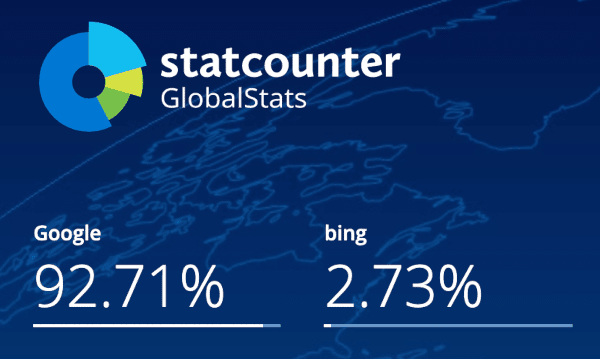
- Launched on June 3, 2009, Bing replaced Windows Live Search, offering an alternative to Google’s dominance.
- Peaking at 4.22% market share in 2011, Microsoft’s Bing Search Engine now accounts for only 2.74% of global web searches.
- Unable to index all of the World Wide Web, Microsoft Bing only allows a fraction of websites in its search engine.
- With narrow search results, users often abandon Bing for Google, which indexes more of the World Wide Web than any other search engine.
- In the fourth quarter of 2020, Bing revenue declined by 18%, while other online platforms grew due to global stay-at-home advisories.
A Brief History of Bing
Years before Google existed, multiple search engines offered different experiences for searching the web. Microsoft’s MSN Search, plagued with production issues, was frequently offline, forcing the vast majority of Windows users to search with Yahoo, AOL, AltaVista, Infoseek, Ask Jeeves, Webcrawler, Excite, Metacrawler, and many others.
Much like the early universe, the World Wide Web experienced explosive growth. None of the existing search engines could handle such large data sets. At best, they could only index a fraction of the web, haphazardly choosing which sites made the cut and which weren’t indexed.
Google emerged when the web exploded with new sites, offering technology to index virtually every public website and rank search results by combining factors benefitting the end-user, not the parent corporation. Google became a verb while Microsoft continued to struggle with search.
Instead of building a better search engine, Microsoft resorted to rebranding, which often provides free publicity. MSN Search became Windows Live Search, then Live Search, and, in 2009, Bing. Microsoft recently renamed Bing as “Microsoft Bing”.
Despite numerous name changes, the underlying technology hasn’t changed much. While Google indexes 35 trillion web pages, Bing, at its peak, indexed less than 20 billion web pages. Google has 1750 times as many indexed web pages as Bing.
Given this disparity, it’s difficult even to consider Microsoft Bing as a search engine. If anything, it’s a limited, curated list of websites. One has to wonder if Bing will be around in a few years, as Microsoft’s search division yields little revenues. Given that Bing loses $1.5 billion a year with a declining user base, it’s hard to imagine Microsoft’s search engine persevering.
Why Bing Produces Poor Quality Search Results
By indexing only a fraction of the web, Bing web searches can only provide limited results. For example, if you’re trying to self-diagnose a health issue, Bing has far fewer websites indexed than Google.
Testing this theory, I searched for “runny nose” on both Google and Bing. Google returns relevant results from authorities. On the other hand, Bing returns some authoritative results; however, after five advertisements, a low quality, tabloid-like news provider ends up being the fourth-highest ranked result.
The tabloid site listed by Bing provides no information about the author. There’s no way to add comments for a dialog with the author. Readers cannot submit errata. It’s difficult to understand why Bing would rank a site with little authority so highly until one examines the source code. The site uses media.net, which is Microsoft and Yahoo’s preferred contextual ad network.
It appears as though Microsoft boosts search results for sites using its ad network. Google doesn’t resort to such remunerative tactics. Paging through the results, it’s clear that the tabloid site manipulating Bing search results doesn’t have the same effect on Google. Google doesn’t even list the site in “runny nose” search results, likely because it has no authority.
Diving into some qualitative results, Bing chooses to index sites with poor grammar and rank them highly. Grammar, spelling, and authority are paramount to Google. If two web pages are similar, Google gives a higher rank to the better-written and more scholarly article. On the other hand, Microsoft Bing seems to rank based on website size and domain age, which are irrelevant to finding accurate information.
It’s like night and day. Google is less spammy and provides better results. Microsoft Bing assaults the end-user with five advertisements and includes non-medical tabloid news sites in search results. It appears as though the few revenues Bing earns comes from essentially spamming users with advertisements.
You can do this exercise yourself. Search for any topic with both Bing and Google. You’ll see Bing inserts more ads in search results. Also, Bing has some questionable, low-quality, tabloid news sources that seem to rank higher than hospitals, universities, or other authorities. Although Google isn’t perfect, it produces better search results with fewer ads because it indexes almost the entire public Web.
How to Use Google on Microsoft Windows 10
With its small user base, many Bing users are likely captive. They use Microsoft Windows and the Edge browser, which default to Bing. If you type a search query into the top address bar on Microsoft’s Edge browser, it uses Bing, unless configured otherwise. Since Bing’s search results are inferior to Google’s, let’s look at how to make Google the default search engine on Windows 10.
Fortunately, due to legal reasons, Microsoft leaves its Edge browser open to other search engines. Edge uses Bing by default; however, users can easily change this. Here’s how to do it:
- Launch Microsoft Edge
- Click the “…” button on the top right of the browser
- Click on Settings
- Click on Privacy & Services on the left Settings panel
- Scroll to the bottom of the screen and click on Address Bar
- Change “Search engine used in the Address bar” to Google.
Bing Irrelevant for Webmasters
At best, Bing accounts for 2.74% of the global search market share. At most, Appledystopia only attained 0.2% of its traffic from Bing. For a site that gets millions of visitors a year, Bing traffic was only in the hundreds. It’s irrelevant for most websites.
Bing forces webmasters to work within a Kafka-esque and baroque system to be indexed. With poorly developed webmaster tools and unresponsive customer support, Microsoft’s search engine seems to create problems for webmasters. Their URL inspection tool may find no issues with a web page, yet the Bingbot won’t index it for undisclosed reasons.
Search engines are a black box for good reason. The more that’s known about a search engine, the easier it is for black hat SEO actors to manipulate results. Despite Microsoft’s efforts, it appears as though plagiarists and bad actors have gamed Bing.
My own site, Appledystopia, was de-indexed by Bing. On further examination, it appears that plagiarists ripped off my content and, adding insult to injury, reported me to Bing. They tried the same thing on Google, to no avail. Google is much better at thwarting black hat SEO tactics, which seem to thrive on Bing.
Abusive tactics actually work on Bing, and that’s the problem. End users and webmasters alike cannot trust Bing. By favoring sites enrolled in the media.net advertising platform, Bing presents users with websites devoid of authority. Fortunately, Microsoft Bing is a mostly irrelevant search engine that has lost billions of dollars for the Redmond-based tech corporation. It’s hard to imagine that Microsoft’s troubled search portal will endure.




